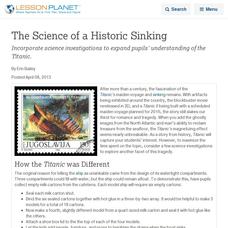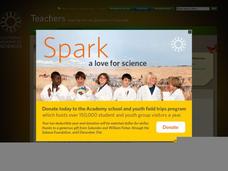Howard Hughes Medical Institute
Gorongosa: Making Observations Activity
Do you have young scientists wanting to make new discoveries rather than just completing the same experiments? Young scientists use their observational skills to identify animals and patterns in animal behavior. Through tracking...
Chicago Botanic Garden
Recognizing Change (Observation vs. Inference)
What is the difference between making inferences and making observations? Young climatologists refer to a PowerPoint to make observations on each slide. They record their observations in a provided worksheet before drawing a...
Royal Society of Chemistry
Observing Chemical Changes—Microscale Chemistry
Want to add a wow factor to your current chemical changes lesson plan? Try a microscale experiment with colorful precipitates! Partnered learners conduct 10 single displacement reactions and record their observations.
Washington Office of Superintendent of Public Instruction
Using Our Senses to Observe
Look around and explore. Little ones use their five senses with some day-to-day activities designed to guide observation and apply STEM strategies. Young scientists learn through comparing/contrasting and...
Freeology
Nature Observations Journal
A journal template makes observing nature a breeze. Super scientists identify an interesting object in nature, draw it, list its details, and compose a written descriptions of their artwork.
Bonneville
Making Observations and Recording Data for Solar Powered Water Pumping
Get pumped about an activity with water pumps. The fifth of seven installments in the Understanding Science and Engineering unit has pupils learn how to make observations, record data, and create data displays. Each group measures the...
University of Colorado
Strange New Planet
The first remote sensors were people in hot air balloons taking photographs of Earth to make maps. Expose middle school learners to space exploration with the use of remote sensing. Groups explore and make observations of a new...
Bethel School District
Observations and Inference
What's the difference between qualitative and quantitative observations? Learners make observations, inferences, and predictions about their environment with a set of questions and activities that are applicable to either language...
American Physiological Society
Did I Observe it or Infer it?
Take the mystery out of inquiry! When young scientists learn to use their keen powers of observation to make smart inferences about a situation, they are well on their way to understanding what the scientific method is all...
Curated OER
Observation and Inference
Assess your young scientists' understanding of the difference between observation and inference with this 20-question multiple choice quiz. It reviews a variety of physics and astronomy concepts, such as solar eclipses and sunspots, the...
Curated OER
The Science of a Historic Sinking
Incorporate science investigations to expand pupils' understanding of the Titanic.
Curated OER
Riding on a Pendulum
A comprehensive resource gets fourth grade physical scientists making observations about the period of a pendulum and then applying knowledge to a playground swing. Through seven different stations, they will record observations and...
Perkins School for the Blind
The Mystery Box - Making Observations and Collecting Data
Making observations and collecting qualitative and quantitative data is a vital skill all scientists need to practice. Help your scientists with partial and no sight learn how to use their other senses to make observations for...
ReadWriteThink
Webcams in the Classroom: Animal Inquiry and Observation
Boost observational skills with an inquiry-based lesson plan that takes scholars on a virtual field trip. With help from webcams, learners observe animals in a zoo or aquarium. Observations go into a journal and a discussion is held to...
CK-12 Foundation
CK-12 Earth Science Concepts for Middle School
Explore a variety of science concepts in an interactive textbook created for middle school scholars. A lengthy table of contents takes readers to pages comprised of a subject overview, outline, and summary. Follow links further to find...
California Academy of Science
What's on a Penny?
As a lesson on scientific observation, have your class investigate the features of a penny and a nickel. Working in pairs, they practice writing detailed descriptions using their senses and a ruler to gather information. This is an...
Baylor College
They're Everywhere: Bacteria
Totally gross out your class with the eighth lesson in this series on food science. Explore the microscopic world of bacteria by taking swabs of different classroom objects and growing colonies in petri dishes. An engaging activity that...
Howard Hughes Medical Institute
Lesson 7: Observations Across Habitats
How are animals in separate but nearby habitats related? Ecology scholars compare the animal inhabitants of the Gorongosa National Park in part seven of an eight-part series. Learners study photos from two different habitats, then...
Curated OER
Perception and Observation
Students use common and unusual objects to make observations of details, design, and functionality. They describe and draw each object while working in small groups. The differences between observation and perception is covered as part...
National Wildlife Federation
Citizen Science to the Rescue!
You don't have to be a scientist or even out of high school to contribute to scientific research. In the 12th lesson in the series of 21, scholars use this opportunity to add to the growing body of scientific knowledge and consider the...
Curated OER
Engaging Young Scientists with Inquiry: Part One
Building inquiry into your science lessons will make science concepts more concrete for your class.
Centers for Ocean Sciences
Ocean and Great Lakes Literacy: Principle 1
Is your current lesson plan for salt and freshwater literacy leaving you high and dry? If so, dive into part one of a seven-part series that explores the physical features of Earth's salt and freshwater sources. Junior hydrologists...
Discovery Education
The Everyday Science of Sports
Physical science juniors will enjoy this sensational enrichment on aerodynamics, especially if they are also sports fans! With a focus on physical features and behaviors, collaborative groups make observations on five different golf...
Royal Society of Chemistry
A Visible Activated Complex Experiment
When was the last time your class saw a catalyst in action? Chemistry scholars observe an activated complex during an engaging experiment. Through both color change and evolution of a gas, individuals gain insight into the...

























